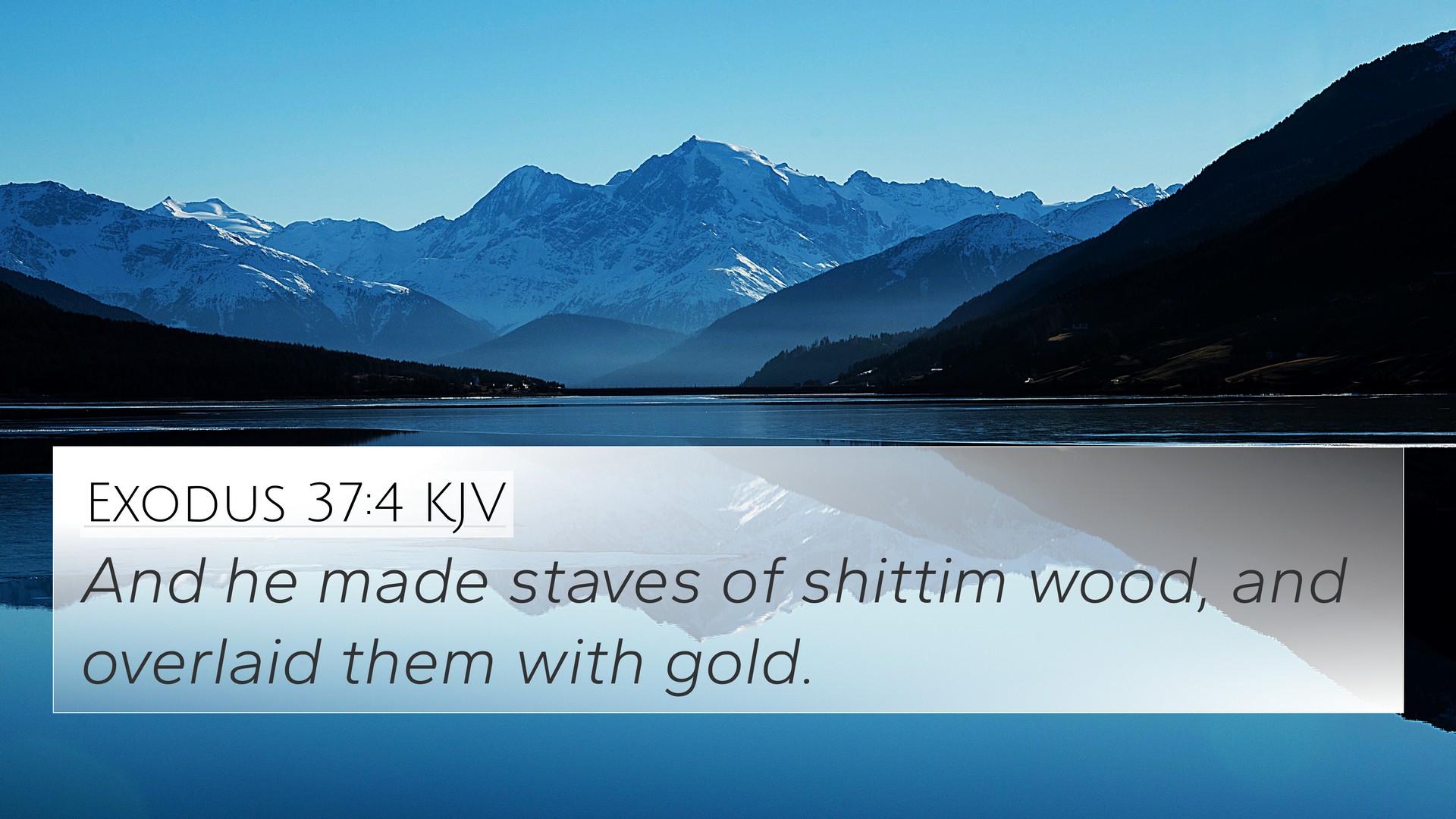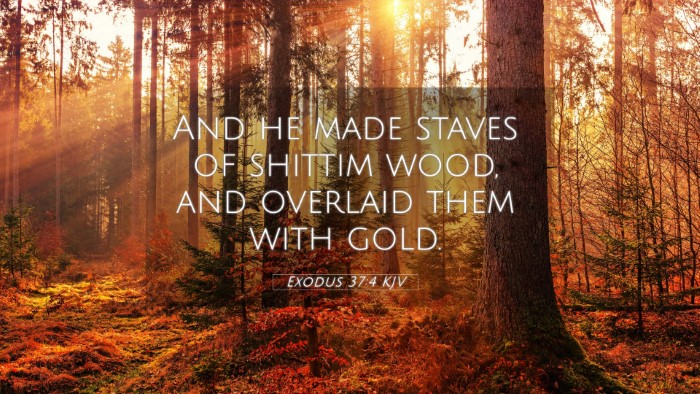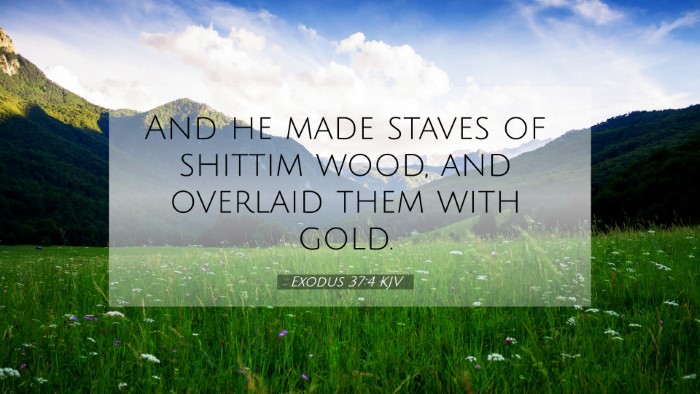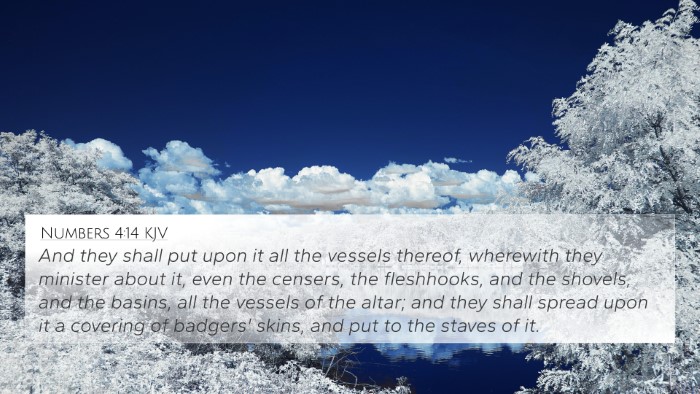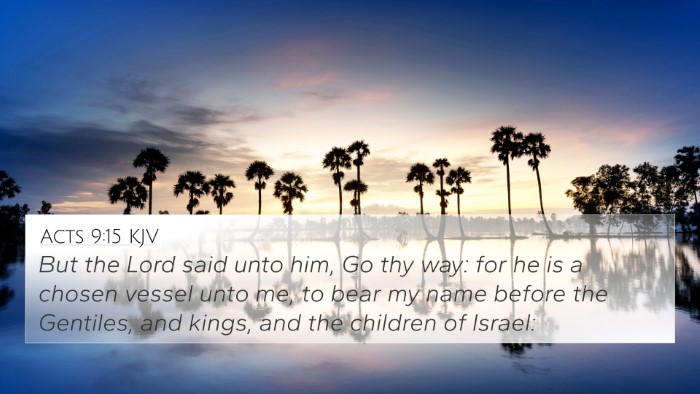Understanding Exodus 37:4
Exodus 37:4 states:
"And he made for the altar of incense gold, and its plates, and its shovels, and its basins, and its snuffers, and its firepans; and he made a perfumed incense of sweet spices, according to the art of the apothecary."
This verse describes the craftsmanship involved in the creation of the altar of incense, highlighting its significance in the Tabernacle worship. The materials used and the details of construction exemplify the importance of holiness and reverence in approaching God.
Commentary Insights
This verse has been the focus of various public domain commentaries, revealing layers of meaning and spiritual symbolism. Let's summarize the insights from notable commentators.
Matthew Henry's Commentary
Matthew Henry emphasizes:
- The significance of materials: The use of gold signifies divinity and purity. Every detail in the construction was meant to reflect God's glory.
- Spiritual implications: The altar of incense symbolizes the prayers of the saints, as incense rises to God, so do our prayers.
- The artistry involved: Craftsmen like Bezalel were endowed by God with wisdom to create stunning works that contribute to worship.
Albert Barnes' Notes
Albert Barnes highlights several key points:
- Purpose of the altar: It plays a crucial role in the sacrificial system, emphasizing the necessity of prayer and worship in the life of a believer.
- Connection with the New Testament: Similar descriptions in Revelation highlight the continuity of the theme of prayer and worship in God's presence.
- Details of the making: The intricacies of its design indicate that worship should be approached with reverence and precision.
Adam Clarke's Commentary
Adam Clarke provides additional perspectives:
- Incense and its significance: The incense represents the sweetness of prayer and worship, acceptable before God.
- Comparative analysis: His commentary encourages readers to draw parallels between Old Testament practices and New Testament worship.
- Moral lessons: The meticulous construction serves as a reminder of the effort that should be put into one's spiritual life.
Cross-References and Thematic Connections
Exodus 37:4 is richly interconnected with several scriptures throughout the Bible, showcasing the thematic cohesion of biblical texts:
- Hebrews 9:4: References the golden altar, linking the significance of incense in both Testaments.
- Revelation 8:3-4: Speaks of incense which symbolizes the prayers of God’s people ascending to Him.
- Psalm 141:2: Compares prayers being offered to incense before God.
- Lamentations 3:44: Mentions the barrier to God, enhancing the understanding of access through prayer.
- Luke 1:10: Highlights the role of incense in the New Testament worship setting during Zechariah's priestly service.
- 1 Peter 2:5: Refers to believers as living stones, building a spiritual house, paralleling the construction of the altar.
- Revelation 5:8: Indicates prayers of the saints are represented by golden bowls full of incense.
Conclusion
The verse Exodus 37:4 is not just a historical reference; it encapsulates a profound truth about worship, holiness, and connection with God. By employing cross-referencing biblical texts, readers can grasp the expansive narrative woven throughout scripture, expanding one's understanding of God's desire for relationship through prayer and worship.
Tools for Further Study
For those seeking to delve deeper into Bible verse connections, here are some recommended tools:
- Bible concordance for finding thematic relations
- Bible cross-reference guide for exploring links between verses
- Cross-reference Bible study methods for gaining deeper insight into scriptural relationships
- Comprehensive Bible cross-reference materials to identify similarities and themes across different texts
Exploring Cross-References
Understanding how to utilize Bible cross-references enriches personal study:
- Identify connections between Old and New Testaments to gain a fuller picture of God's plan.
- Conduct a detailed cross-reference between Gospels to see differing perspectives on key events.
- Consider thematic links between the Prophets and Apostolic teachings for cohesive understanding.
In summary, Exodus 37:4 serves as a gateway into understanding the importance of worship, prayer, and the consistent revelation of God's nature throughout the Bible.
